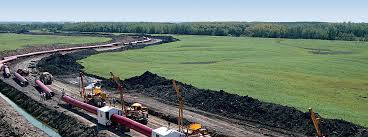
File Photo.
More groups are weighing in on the Energy East Pipeline project.
This following Thursday’s announcement from the Ontario Energy Board that the potential environmental risks outweighed the potential benefits.
The OEB also said in its report that natural gas prices would likely rise.
Friday, the Environmental Defence’s Adam Scott issued a release saying input from over ten thousand people across the province that presented showed “ clear the risky project does not have support.”
Scott says the plan to build the pipeline to bring Alberta crude to refineries in Quebec, including through North Bay, made “significant threats to watersheds” and that the process heard concerns from Metis and First Nations about insufficiently fulfilled rights.
Scott’s group went further, however, saying the OEB’s report also used “outdated and inaccurate information, vastly underestimating Energy East’s impact on our climate” saying Energy East’s expansion would be similar to putting seven million more cars on the road.
However, in something of a case of battling releases, the Federation of Northern Ontario Municipalities sent out its own information, titled “Energy East-the safest choice”’
FONOM’s release says two hundred thousand barrels of oil are transported across Canada by rail, many through the heart of Northern Ontario communities.
FONOM’s view is while the rail industry is vital to Northern communities it may not be as safe an option to transporting oil as the pipeline is.
FONOM’s president, Al Spacek, who is also the mayor of Kapuskasing, says FONOM has always been supportive of the pipeline initiative, saying TransCanada has “proven that they follow the highest safety and environmental standards, which is vital to us.”
Spacek says “it would be unreasonable for us to pretend we can get off oil, diesel and gasoline anytime soon” and that oil transported by rail in the province double by 2024, meaning more than three hundred thousand railcars moving through communities.
Spacek says transporting by pipeline is “significantly safer” than other modes of transportation and that FONOM will continue to make sure “communities, and our region’s interests are heard.”


